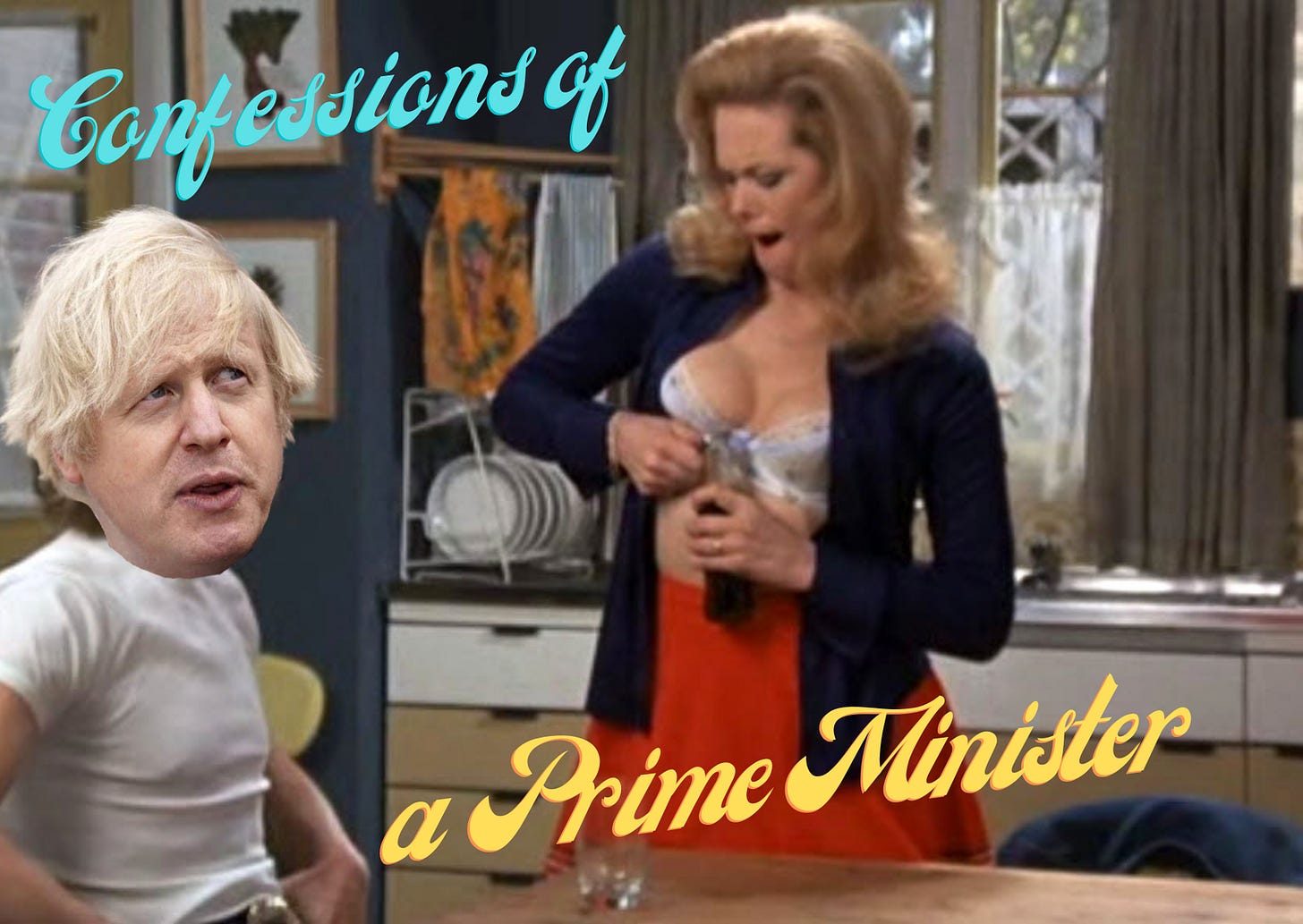“If it’s not shagging, who cares?” Why the British media tends to let ‘boring’ corruption slide
... but we can still recall that Mellor Chelsea kit lie and that unfortunate demise with an orange.
There was an interesting item in Patrick Maguire’s RedBox — a political email newsletter from The Times rather than a niche porn title— on Thursday. Reflecting on the ongoing lobbying scandal and David Cameron’s Greensill playdate in a Saudi sandbox, Maguire wrote:
Beware confident conclusions that this week’s revelations could harm the government as sleaze did for John Major, however.
Polling by YouGov yesterday suggests that an overwhelming majority of Britons aren’t following the Cameron stories closely – if at all.
Red Box is shocked — shocked — to learn that all this talk of supply chain finance isn’t setting beer gardens alight.
Appearing in a paper review segment on Times Radio — brand synergy! — Maguire expanded on his thoughts by noting that a scandal involving supply chain finance and the ins and outs of Matt Hancock’s shareholdings is never likely to cut through like the sex scandals of the Major-era. He’s right. But even sex scandals in the Johnson era, which already sounds like a porn innuendo, don’t have much of an effect.


As I’ve written before, sex, lies and looking a state are largely priced in with Boris Johnson. The media accepts that and, in turn, contributes to a significant portion of the public feeling unbothered by his bonking and bloviating. Just as Brexit was breakfast, ‘Boris is Boris’.
The scandals of the Major years were frequently about sex and came after the Prime Minister foolishly waved a red flag at the press with his October 1993 ‘Back to Basics’ speech:
The old values – neighbourliness, decency, courtesy – they're still alive, they're still the best of Britain. They haven't changed, and yet somehow people feel embarrassed by them.
Madam President, we shouldn't be. It is time to return to those old core values, time to get back to basics, to self-discipline and respect for the law, to consideration for others, to accepting a responsibility for yourself and your family and not shuffling off on other people and the state.
Major’s words were practically drowned out by the sound of filing cabinets being flung open in newspaper offices and every hunch or whisper about ministerial malfeasance being studied carefully.
Despite themselves having the morals of an alleycat who is looked down on by the other street cats for being ‘a bit much’, the tabloids were delighted at the chance to dig for dirt with the excuse that they were rootling out hypocrisy.
Piers Morgan, then editor of The News of the World, wrote in his diary:
Major brought all these exposés on himself with that ludicrous ‘Back to Basics’ speech at the last Tory conference, but I am beginning to wonder where it will all lead. It strikes me that probably every Tory Mp is up to some sexual shenanigans, but we can hardly get them all fired or there will literally be nobody left to run the country. Still, need must…
The David Mellor story was broken by The Sun the year before ‘Back to Basics’. It concerned his extra-marital affair with the actress Antonia de Sancha and was spiced up significantly by a series of outright lies concocted by Max Clifford, the puppetmaster publicist who was later jailed for a series of sexual assaults and died in prison in 2017.
Clifford told The Sun that Mellor had sucked de Sancha’s toes in bed and worn a Chelsea shirt during sex — both claims were later revealed to be total fabrications by de Sancha herself in a 2002 interview with The Guardian. While people remember the Chelsea shirt lie, they tend to forget that Mellor remained in office for two months after the affair story broke, forced to resign instead because he accepted a free holiday from the daughter of a senior member of the Palestine Liberation Organisation (PLO).
The sex scandal remains in our collective memory but the financial shenanigans fade fast; too complicated and detailed to stick unlike the horrifying false memory of Mellor mid-coitus in a Chelsea top.


Similarly, Stephen Milligan is stuck in the public consciousness as the Tory MP who died at home on 7 February 1994, dressed in stocking and suspenders, with an electrical flex tied around his neck, a black bin liner over his head and an orange in his mouth. The coroner recorded a verdict of ‘death by misadventure’, concluding Milligan died accidentally as a result of autoerotic asphyxiation. No drugs or alcohol were found in his blood.
However, in the years since Milligan’s death questions have been raised about the explanation for his death. In 2018, his former BBC colleague, John Simpson told an audience at the Henley Literary Festival that he believed the MP was murdered by Russian spies in revenge for Milligan’s reporting on corruption and organised crime in the country during his career as a journalist.
Simpson’s notion is supported in part by an interview with an unnamed ‘former girlfriend’ of Milligan’s published by The Independent on February 9, 1994. She told the paper that she believed he had been killed by someone seeking to destabilise the Major government. A similar claim turns up in the memoirs of Gerald James, a businessman whose arms firm Astra was involved in the ‘Arms to Iraq’ affair, who turned whistle-blower.
James writes in his book ‘In The Public Interest’ that he believed Milligan was one of eight individuals killed in similar circumstances to keep details of government involvement in illegal arms sales from becoming public.


Milligan was a far more interesting character than the tabloid caricature of his death painted him. He was a former Economist journalist who had presented The World Tonight on Radio 4 and gone on to be foreign editor and Washington correspondent for The Sunday Times and European correspondent for the BBC.
At the time of his death, Milligan had only been an MP for two years. He was elected as MP for Eastleigh in the 1992 General Election and was quickly made Parliamentary Private Secretary to Jonathan Aitken — more on him shortly — who was then Minister of State for Defence.
But questioning the circumstances of Milligan’s death at the time would have been a little bit too much trouble for the newspapers, especially the tabloids, and with ‘Back to basics’ it was a convenient bit of evidence about the broken government. In his diaries, on February 8 1994 — the day after Milligan’s death was announced — Piers Morgan wrote:
A Tory MP called Stephen Milligan has been found dead, hanging trussed up with electric flex, wearing women’s stockings and suspenders, with a black bin liner over his head, and an orange suspiciously lying nearby. Nobody’s quite sure what he was doing. But one thing’s for sure, John Major’s ‘Back to Basics’ speech probably didn’t include this particular form of nocturnal pursuit.
The next entry, written four days later, begins:
We got wind late in the day that the Sunday Mirror were exposing a portly 47-year-old Tory MP called Hartley Booth for having an affair with a 22-year-old nude model called Emily Barr. Just to complete the amusement Booth is a lay preacher in his spare time. Emphasis on the word ‘lay’, clearly. What is it with these Tories? … He denied having sex with her… but he has resigned anyway, saying, ‘I hate double standards and stood as an MP for the family.’ Which is admirably honest…
Milligan’s name or at least the circumstances of his demise remain in public memory but the Hartley Booth story was gone as fast as you can say chip wrapping. But other scandals are barely ever mentioned either — ones that involve figures still considered ‘big beasts’ of British politics.
Sir Keir Starmer has reportedly sought the advice of Lord Mandelson in his quest to fully complete his Tony Blair cosplay kit.
But Mandelson, then just plain old Peter, resigned from the Blair administration twice — in 1998 for failing to disclose a £373,000 loan from the Paymaster General Geoffrey Robinson and again in 2001 after accusations that he’d used his position to influence a passport application by Srichand Hinduja, who was seeking British citizenship at the same time his family firm had agreed to be main sponsor of the Millennium Dome’s Faith Zone.
One of the British government’s famous ‘independent’ inquiries — this one conducted by Sir Anthony Hammond (a former Home Office official who had been involved in hushing up details about the ‘Arms to Iraq’ affair) — concluded that Mandelson had not broken the rules. He was back in the Cabinet by 2008, this time with a peerage.
The Hinduja affair and the Bernie Ecclestone debacle — where the Labour Party was forced to return a million-pound donation from the F1 boss after it suspiciously changed policy to allow Formula One to continue being sponsored by tobacco manufacturers — are rarely mentioned now. They were complicated cases and didn’t have the pop of a football strip fucking or death seemingly by autoerotic asphyxiation.



Similarly, Alastair Campbell has been able to smoothly rebrand himself as a mental health advocate and ‘sensible’ voice in political debate. The details of his behaviour during and after the run-up to the Iraq War are fading into history. As is the death of Dr David Kelly, for which the official explanation remains strikingly unconvincing and the subject of debate by experts.
Maguire is right that the Greensill scandal is complicated and unlikely to cut through despite Keir Starmer’s attempts to tie it back to ‘90s ‘sleaze’. But that’s a failing of the British press as much as it is an indictment of the interests of readers and viewers. How interesting audiences find stories is a function of how they are packaged.
Of course, it’s easier to make sex scandals an exciting read. People like gossip and salacious details — and I don’t exempt myself from that — but often stories about sex only become important when they’re tied to influence.
Boris Johnson has never been a tubthumping advocate of ‘family values’ so it’s hard to hit him with a hypocrisy charge over his affairs and indeterminate number of offspring. But the Arcuri affair is about more than that; it’s about him allegedly using his power as Mayor of London to ensure preferential treatment for his mistress.
That David Cameron was not, as far as we know, cuddling up to Lex Greensill shouldn’t mean the story carries any less punch. If the details are hard to unpick — and they are — it’s the job of a journalist to do that. I’ve heard hacks say, “If I can’t understand this, how can I expect the readers to?” and it’s a bad excuse. Work harder, learn more.
British politicians often get away with outright corruption because it’s all too complicated for hacks to sum up with a catchy line and a pithy scandal name. But there’s another element too: Journalists are notorious for fiddling their own expenses. How many when they encounter financial misdeeds by MPs and others secretly think “Well, I’d do the same if I had the chance…”?



